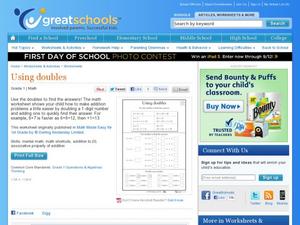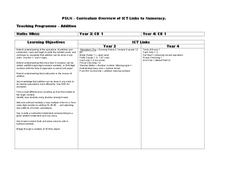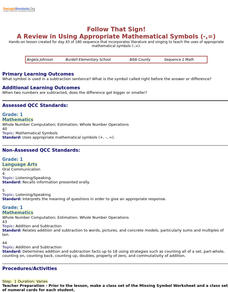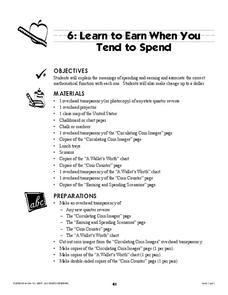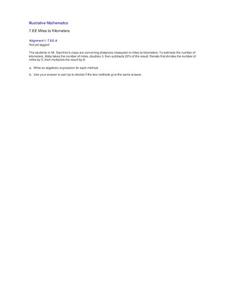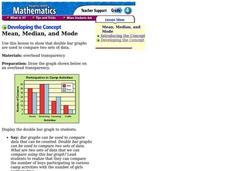Curated OER
Using Doubles to Subtract
In this subtraction worksheet, 1st graders use addition doubling patterns to subtract numbers. For instance, one problem asks students to subtract three from six. They are directed to think that 3+3=6. Students write the answer to 6-3.
Curated OER
Using Doubles
Bring this easy shortcut to your first grade addition lesson! By adding doubles (6+6, for example), and then adding or subtracting 1, kids learn how to solve simple addition problems with ease. This trick is especially helpful for...
Curated OER
Use Doubles to Subtract
For this math word problem practice worksheet, students sharpen their math skills as they use problem solving strategies to solve 6 problems.
Curated OER
Math Worksheets: Subtraction Worksheet, Double-Digits
Practice worksheets play a major role in math class. Learners use their math skills to solve 20 problems that require them to subtract 2-digit numbers from 2-digit numbers. Note: No regrouping is needed.
Curated OER
Using Doubles To Subtract
In this subtraction worksheet, 2nd graders use numerals that are doubles. Students complete 10 addition and subtraction problems.
Curated OER
Use Symbols to Subtract
Students practice crossing out items in a group in order to complete subtraction problems. In this subtraction lesson plan, students watch a PowerPoint presentation and then practice problems on their own.
PBS
Patterns to the Rescue!
Track down the Cyberchase episode that this lesson plan is associated with. Using a worksheet that is embedded in the plan, learners must find the next two numbers and shapes (a double pattern). Once these have been discovered, pupils...
Curated OER
Curriculum Links To Numeracy
Youngsters practice looking for the links to numeracy in their classes. This isn't a worksheet but a curriculum guide for an entire unit. Teachers can use any part of the resource to extend or inform their teaching practices related to...
Curriculum Corner
Order of Operations Task Cards (2)
Young mathematicians use their PEMDAS knowledge to solve 20 different task cards. They evaluate expressions to find the answer of multiplication, division, addition, subtraction, and exponential problems. Then, they record their answers...
Curated OER
Follow That Sign! A Review in Using Appropriate Mathematical Symbols
Kids gain a deeper understanding of mathematical symbols, by playing an interactive game using flash cards. They complete an attached Missing Symbols Worksheet, flash card and an assessment are also included.
Curated OER
Introduction to Exponents
Problem solve using exponents. Pupils read One Grain of Rice: A Mathematical Folktale and write powers to represent amounts from the story.They compare actual solutions to their predictions and play a game to practice using...
Curated OER
Learn to Earn When you Tend to Spend
Analyzing and understanding word problems is extremely important. Pupils learn that in money problems, earn usually means you add and spend usually means you subtract. They will solve a series of money-related word problems, label coins,...
Illustrative Mathematics
Miles to Kilometers
Can your mathematicians come up with an easy way to convert miles to kilometers? Start by asking learners to write an algebraic expression for each of the descriptions given. Once they determine that they are both the same, ask...
Noyce Foundation
Sewing
Sew up your unit on operations with decimals using this assessment task. Young mathematicians use given rules to determine the amount of fabric they need to sew a pair of pants. They must also fill in a partially complete bill for...
Curated OER
Line and Double Line Graphs: Practice
In this graphing data worksheet, students use the double line graph to answer the five questions about high and low temperatures. Students then complete two test prep questions.
Balanced Assessment
Birthday Card
Add a twist to the practice of simplifying expressions. The task asks scholars to decode a mathematical puzzle using their knowledge of expressions. If they are able to write and simplify the expression, the mathematics behind the puzzle...
Balanced Assessment
Number Game
It's all in the numbers! Create a mathematical model to analyze a number game and develop a winning strategy. Using a given numerical pattern, scholars write an expression to model the scenario. They then interpret the pattern of the...
Curated OER
Favorite Number Game Using Age and Change in Your Pocket
In this number game, students use algebra to prove this age and change in your pocket number guessing game. Students end with a number where the first two digits are their age and the last two digits are the change in their pockets.
Curated OER
The Language of Algebra
In this language of algebra instructional activity, 8th graders solve and complete 6 different problems that include using different terminology to illustrate algebraic problems. First, they match the pictures on the right with the...
Curated OER
Adding and Subtracting Bears and Goats
First graders evaluate math problems using farm animals. For this consumer math lesson, 1st graders discover math problems which concern quantities of farm animals. Students discover new strategies to help them analyze their...
Curated OER
Mean, Median, and Mode
Fourth graders compare two sets of data by using a double bar graph. In this data analysis lesson plan, 4th graders study a double bar graph and complete questions based upon the data. Students construct a table to show the data from the...
Curated OER
Using the Overhead and Algebra to Correctly Guess the Number
In this questing numbers worksheet, students use algebra equations to discover how the teacher correctly chooses the students' numbers each and every-time. A pencil, key, stamp, yarn, and overhead are needed for this activity.
Curated OER
Adding and Subtracting
Students will add and subtract numbers less than 100 as well as understand and use the inverse relationship between addition and subtraction. They compose/decompose numbers up to 10 and understand a variety of situations in which...
Houghton Mifflin Harcourt
Unit 2 Math Vocabulary Cards (Grade 4)
The 28-page resource contains cards with terms relating to multiplication from inverse operations to front-end estimation to array. Each sheet contains two cards; one with the word and one with the definition.

